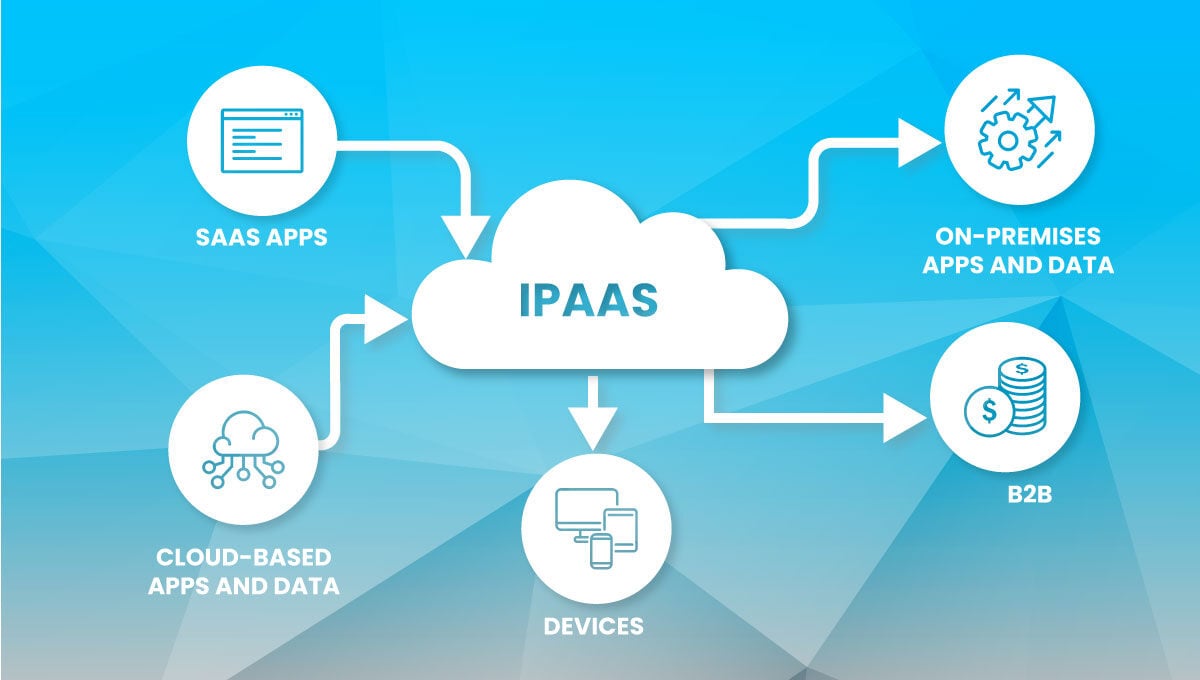What is iPaaS?
As demand for cloud-based services expands, Integration Platform as a Service is on the rise. IPaaS automates connecting applications, processes, and data.
Integration Platform as a Service (iPaaS) is a suite of cloud services enabling development, execution and governance of integration flows connecting any combination of on-premises and cloud-based processes, services, applications and data within individual or across multiple organizations.
- Gartner Glossary
iPaaS connects apps that run locally or in the cloud and across clouds.
There is also Enterprise Integration Platform as a Service (EiPaaS) for large enterprises (EiPaaS). Gartner says an EiPaaS provider offers “high availability, disaster recovery, security, service-level agreements, and technical support.”
Why Should You Use iPaaS?
Efficiency and economy.
IT departments may be able to handle integrations themselves. But sometimes, it’s more efficient to outsource it to a third-party iPaaS provider, who will have comprehensive integration toolsets and pre-built data connectors. If you need custom connectors, they can build them for you.
Custom work can be expensive if you consider the large number of integrations an enterprise requires. iPaaS saves on these costs through automatic API generation.
Speedy integration and greater business agility.
It takes about 34 days to hand-code a single, non-standardized API. But a vendor’s iPaaS can expose your data in minutes. It does this by auto-generating REST APIs for cloud services.
An iPaaS lets you add and remove cloud apps and microservices whenever necessary with no significant business risk, helping you respond to changing circumstances quickly.
Lighten your IT app integration workload.
The explosion of cloud services and microservices means enterprises are quickly adding and removing business apps. Enterprise app sprawl is swelling. One 2021 report found businesses rely on an average of 254 apps to do work.
Integrating all that app data can be a mammoth task. And you’ll want to prevent apps from being siloed into various departments.
Outsourcing your app integration work will give your IT people more time to focus on higher-value work.
Convenience, ease of use, and SaaS support.
Using iPaaS makes it easy for you to deploy platforms, integrate data, and manage all your app processes. It simplifies your tech infrastructure by creating a virtual platform that connects apps and resources for a consistent structure.
Supports many protocols and data formats.
An iPaaS provider is usually ready to support many protocols, including HTTP, FTP, Open Data Protocol, and Advanced Messaging Queuing. And it can process, clean, and transform data in formats like XML and JSON.
Support for real-time processing and batch data integration.
If you need to collect live data from many sources, including social media and eCommerce sites, iPaaS can do it for you reliably, without fuss. If your needs are not so urgent, iPaaS can also do your more routine batch data integration.
Automatic system monitoring.
An iPaaS solution will monitor your system integration for failures, latency, resource use, and workflow performance.
Security.
With the rise of hackers and security threats, it never hurts to have more data security. iPaaS providers have security mechanisms for access control, data encryption, and single sign-on integrations.
When is iPaaS Not Recommended?
You don’t have time to vet all the vendors.
iPaaS offerings are not standardized into a single, universal set of features and functionality. You must do in-depth comparative research to get the right iPaaS for your needs.
That means you must be clear and specific about your business integration needs to assess all the contenders.
It also means you should get references. Talk to customers of iPaaS vendors who match your scale, complexity, and industry.
You haven’t trained your non-IT people on how to use the iPaaS.
Because iPaaS tools are so easy to use, you may put too much power in the hands of individual departments that lack the expertise of IT professionals. They may accidentally cause data breaches through ignorance of essential security practices.
You’ll have to train your non-IT employees on the data compliance practices for your industry before you do iPaaS. They also need to know how to secure payment card information.
You need clear procedures to prevent the risk of human error.
You don’t have a data governance program yet.
Even an excellent iPaaS provider needs oversight. You need data and integration governance to guide and help monitor and assess the performance of the selected iPaaS vendor. Good standards and policies governing your business data should extend to your outsourced integration provider.
Summary of iPaaS considerations
The prime advantages of iPaaS lie in increased efficiency, high scalability, and process optimization. Here is our summary of the benefits and potential issues when considering an iPaaS solution.

Read More ...
7 Elements of a Successful Integration Strategy
PhenomᵉCloud is a comprehensive technology solutions provider committed to empowering businesses to overcome challenges, enhance their workforce capabilities, and achieve superior outcomes.


Leave a Comment